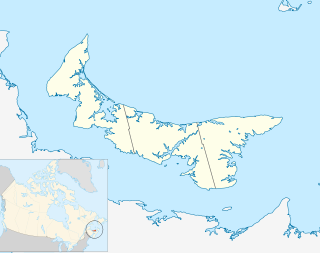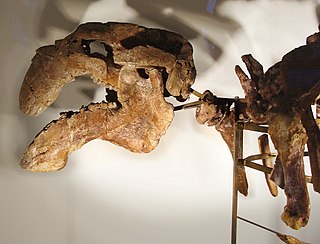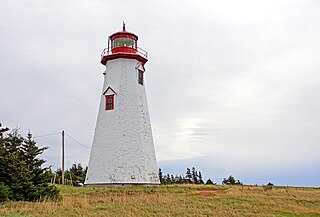
An archipelago, sometimes called an island group or island chain, is a chain, cluster or collection of islands, or sometimes a sea containing a small number of scattered islands.

The Bering Sea is a marginal sea of the Pacific Ocean. It forms, along with the Bering Strait, the divide between the two largest landmasses on Earth: Eurasia and The Americas. It comprises a deep water basin, which then rises through a narrow slope into the shallower water above the continental shelves.

Steller's sea cow is an extinct sirenian described by Georg Wilhelm Steller in 1741. At that time, it was found only around the Commander Islands in the Bering Sea between Alaska and Russia; its range was more extensive during the Pleistocene epoch, and it is possible that the animal and humans previously interacted. Some 18th-century adults would have reached weights of 8–10 t and lengths up to 9 m (30 ft).

Georg Wilhelm Steller was a German botanist, zoologist, physician and explorer, who worked in Russia and is considered a pioneer of Alaskan natural history.

The Jersey is a British breed of small dairy cattle from Jersey, in the Channel Islands. It is one of three Channel Island cattle breeds, the others being the Alderney – now extinct – and the Guernsey. It is highly productive – cows may give over 10 times their own weight in milk per lactation; the milk is high in butterfat and has a characteristic yellowish tinge.

The Commander Islands or Komandorski Islands or Komandorskie Islands are a group of treeless, sparsely populated islands in the Bering Sea located about 175 kilometres (109 mi) east of the Kamchatka Peninsula in the Russian Far East. The islands consist of Bering Island, Medny Island and fifteen smaller ones, the largest of which are Tufted Puffin Rock , 15 hectares, and Kamen Ariy, which are between 3 kilometres (1.9 mi) and 13 kilometres (8.1 mi) west of the only settlement, Nikolskoye. Administratively, they compose Aleutsky District of Kamchatka Krai in Russia.

Tignish is a Canadian town located in Prince County, Prince Edward Island.

Lot 1 is a township in Prince County, Prince Edward Island, Canada created during the 1764–1766 survey of Samuel Holland. It is part of North Parish.
Jennifer Abbott is a Canadian director and editor, who specializes in social justice and environmental documentaries. She is best known as the co-director and editor of the documentary, The Corporation (2003), which examines large corporations in the 21st century. The documentary received 26 awards, including a Sundance Film Festival award, a Genie for best documentary and a top ten film of the year by the Toronto International Film Festival - though disqualified from the Oscars as an Ontario broadcast preceded the LA theatrical release.

North Cape is a cape at the northwestern-most extremity of Prince Edward Island, Canada. It is located within the community of Seacow Pond.

Sirenia is the order of placental mammals which comprises modern "sea cows" and their extinct relatives. They are the only extant herbivorous marine mammals and the only group of herbivorous mammals to have become completely aquatic. Sirenians are thought to have a 50-million-year-old fossil record. They attained modest diversity during the Oligocene and Miocene, but have since declined as a result of climatic cooling, oceanographic changes, and human interference. Two genera and four species are extant: Trichechus, which includes the three species of manatee that live along the Atlantic coasts and in rivers and coastlines of the Americas and western Africa, and Dugong, which is found in the Indian and Pacific oceans.

Tignish-Palmer Road is a provincial electoral district for the Legislative Assembly of Prince Edward Island, Canada. It was formerly Tignish-DeBlois from 1996 to 2007.

Robert Joseph "Bobby" Morrissey is a Canadian politician. He represents the electoral district of Egmont in the House of Commons of Canada. He is a member of the Liberal Party.

Eotheroides is an extinct genus of Eocene sirenian. It is an early member of the family Dugongidae, which includes the extant dugong. Fossils have been found from Egypt, India, and Madagascar. Eotheroides was first described by Richard Owen in 1875 under the name Eotherium, which was replaced by the current name in 1899.

Chapel Island is an island in Bras d'Or Lake on Cape Breton Island, Nova Scotia, Canada. Its name in the Miꞌkmaq language is Mniku but other names such as Vachlouacadie and Pastukopajitkewe'kati which translates to "sea cow place".

Cows is a Canadian ice cream manufacturer and chain of ice cream parlors based in Charlottetown, Prince Edward Island. Cows was founded in Cavendish, Prince Edward Island in 1983, and has since expanded into cheddar cheese, and cow-themed merchandise. Cows was named "Canada's best ice cream" in a survey of readers of Reader's Digest and named the world's top place to get ice cream by Tauck World Discovery.

The Seacow Head Light is a lighthouse on the south-central coast of Prince Edward Island, Canada, west of Central Bedeque. It was built in 1864. The lighthouse was relocated in 1979 to avoid erosion. The lighthouse appeared in several episodes of the television series Road to Avonlea and was home to one of the series' main characters, Gus Pike.

Seacow Pond is an unincorporated settlement in Lot 1 on Prince Edward Island.
Dioplotherium is an extinct genus of mammal known from Neogene deposits in the southeastern United States.















